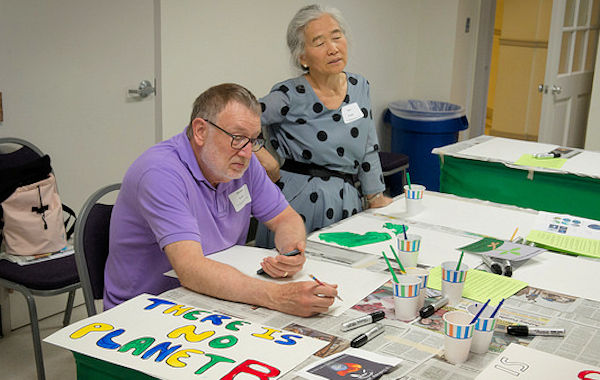Transforming the world moves the church from “what is” to “what ought to be,” as the kingdom of God.
Rev. Dr. Jacob Dharmaraj, President of the National Federation of Asian American United Methodists, has written a 3-part series for the blog UM & Global about the difference between advocacy and charity.
Part 1
He begins part 1 by saying: “As we rumble along the potholed 21st century mission road, and when we look at the expansive landscape of God’s worldwide community and smell and inhale the overwhelming love of Jesus Christ for the whole of God’s creation, one resounding message the hurting world expects to hear from the church is this: “We see you; we truly care about you. We will not normalize destitution; we will not substitute Christian charity as a response to violence, oppression, inequality, and injustice.
“The overwhelming need of the hour is not being more religious but being more humane to listen to the cry of the victims of abuse and exploitation both in our own backyard and beyond; not to be more dogmatic in our belief but to demonstrate our commitment to Jesus Christ through active intervention for the weak and standing in solidarity with the exploited in hours of their greatest susceptibility. By doing so, we indeed join the throngs of biblical advocates like Joseph, Moses, Nathan, Nehemiah, Daniel, Esther, Paul, Apollos, and numerous others for humane and compassionate treatment of the strangers and neo-neighbors among us.”
Dharmaraj goes on to define the difference between charity and advocacy. He states, “[Charity] is the translator of the gospel; [advocacy] is the interpreter of the Gospel.” Advocacy, he explains, “addresses the root causes of the problem and generates a lasting result which embraces all involved.” He also asserts, “Charity robs one’s identity and fosters a dependent, paternalistic, donor-donee paradigm.”
Part 2
In part 2 Dharmaraj develops the theology of advocacy further. “Unlike charity, which has been widely practiced and decorously promoted, advocacy does not get much fanfare or accolade today. It is not often preached about from the pulpits. Not much has been written about theology of advocacy. Confusion between the missional function of charity and missional task of advocacy abound. Hence, I would like to outline the importance of the creation of a theology of advocacy and the preclusion of charity and advocacy as binary division.”
Dharmaraj calls the theology of advocacy “a theology of engagement, a communal activity, and a mobilized movement; a theology that would define advocacy from a biblical and theological perspective by seeking its place in the world which is a God’s intended entity not yet consummated; a theology that would help us faithfully engage in the public square, just like Moses, Joseph, Esther, and others did during Old Testament time; a theology that would help us actively witness to the whole Gospel of Jesus Christ to the whole world, just like Paul, Apollos, Barnabas, and others did during the New Testament time.”
Part 3
In his final reflection in the series, Dharmaraj encourages churches, agencies and individuals to “scrap the unfair duality between advocacy and charity, and replace it with missional reality, scriptural faithfulness, and life-enhancing practicality.”
He recommends new collaborations between Christians and secular partners that “improve the lot of humanity by building bridges even with those who question our beliefs.” Dharmaraj observes that “many of our constituents are bowling alone. They belong to fewer community-oriented organizations and are increasingly atomized, anomic, and apathetic subjects of the community rather than active participants within it. Our voice in public leverage and how to shape humans into transformative agents should never be limited or accrued to just a few tiers of our denomination. It should be picked up from annual conference to local church level.”
Last Updated on July 19, 2017

